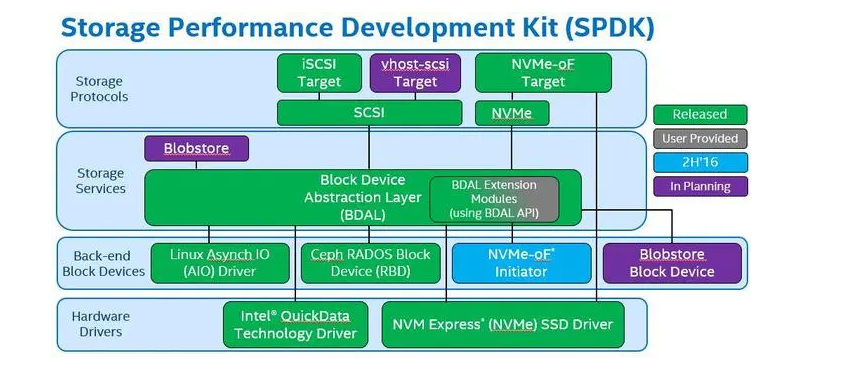首先,需要了解VPP框架和负载均衡的基本原理。
VPP(Vector Packet Processing)是一种高性能网络数据平面处理框架,可以在多核CPU上进行数据包的快速转发和处理。负载均衡是一种将网络流量分摊到多个服务器或网络设备上的技术,以提高系统的可靠性、稳定性和性能。
要实现VPP框架的负载均衡功能,可以编写一个插件(plugin),该插件作为VPP的扩展模块被加载,并对数据包进行分类和转发。以下是一个简单的插件实现示例:
- 创建插件代码文件(lb_plugin.c)并定义插件结构体:
#include <vlib/vlib.h>
#include <vnet/vnet.h>
#include <vnet/ip/ip.h>
typedef struct {
u32 next_index;
} lb_plugin_trace_t;
/* packet trace format function */
static u8 * format_lb_plugin_trace (u8 * s, va_list * args) {
lb_plugin_trace_t * t = va_arg (*args, lb_plugin_trace_t *);
s = format (s, "LB_PLUGIN: next index %d", t->next_index);
return s;
}
/* plugin main function */
static uword lb_plugin_node_fn (vlib_main_t * vm, vlib_node_runtime_t * node, vlib_frame_t * frame) {
u32 n_left_from, * from, * to_next;
lb_plugin_trace_t *t;
vlib_node_t *n = vlib_get_node_by_name (vm, (u8 *) "lb_plugin");
u32 next_index = node->cached_next_index;
vnet_main_t *vnm = vnet_get_main ();
vnet_interface_main_t *im = &vnm->interface_main;
from = vlib_frame_vector_args (frame);
n_left_from = frame->n_vectors;
to_next = vlib_frame_vector_args (frame);
while (n_left_from > 0) {
u32 bi0;
vlib_buffer_t *b0;
ethernet_header_t *eth0;
ip4_header_t *ip0;
udp_header_t *udp0;
u32 sw_if_index0;
u32 dst_addr0;
/* get next buffer */
bi0 = from[0];
b0 = vlib_get_buffer (vm, bi0);
/* get packet headers */
eth0 = vlib_buffer_get_current (b0);
ip0 = (ip4_header_t *)(eth0 + 1);
udp0 = (udp_header_t *)(ip0 + 1);
/* get destination interface and address */
sw_if_index0 = vnet_buffer (b0)->sw_if_index[VLIB_RX];
dst_addr0 = ip0->dst_address.as_u32;
/* lookup load balancing table and update next index */
// TODO: implement load balancing algorithm
/* set next node and trace */
vnet_buffer (b0)->sw_if_index[VLIB_TX] = sw_if_index0;
t = vlib_add_trace (vm, node, b0, sizeof (*t));
t->next_index = next_index;
/* send the packet to the next node */
to_next[0] = bi0;
to_next += 1;
n_left_from -= 1;
}
/* return number of processed packets */
vlib_put_next_frame (vm, node, next_index, n_left_from);
return frame->n_vectors;
}
/* register plugin and node */
VLIB_REGISTER_NODE (lb_plugin_node) = {
.function = lb_plugin_node_fn,
.name = "lb_plugin",
.vector_size = sizeof (u32),
.format_trace = format_lb_plugin_trace,
.type = VLIB_NODE_TYPE_INTERNAL,
.n_errors = 0,
.error_strings = NULL,
.n_next_nodes = 1,
.next_nodes = {
[0] = "interface-output",
},
};
clib_error_t *
lb_plugin_init (vlib_main_t * vm) {
return 0;
}
VLIB_INIT_FUNCTION (lb_plugin_init);
- 实现load balancing算法(这里使用最简单的轮询算法):
/* load balancing table */
typedef struct {
u32 sw_if_index;
ip4_address_t address;
} lb_entry_t;
static lb_entry_t lb_table[] = {
{ 1, {{192,168,1,1}} },
{ 2, {{192,168,1,2}} },
{ 3, {{192,168,1,3}} },
};
static u32 lb_table_size = ARRAY_LEN(lb_table);
/* load balancing algorithm: round robin */
static inline u32 lb_rr (u32 dst_addr) {
static u32 index = 0;
u32 i;
for (i = 0; i < lb_table_size; i++) {
if (dst_addr == lb_table[index].address.as_u32) {
u32 sw_if_index = lb_table[index].sw_if_index;
index = (index + 1) % lb_table_size;
return sw_if_index;
}
}
return ~0;
}
- 在插件初始化函数中注册load balancing算法:
clib_error_t *
lb_plugin_init (vlib_main_t * vm) {
lb_main_t *lbm = &lb_main;
lbm->lb_rr = lb_rr;
return 0;
}
- 在VPP启动配置文件中添加插件配置:
plugins {
...
plugin_path /path/to/plugin/
plugin lb_plugin.so {
// TODO: add configuration options
}
...
}
- 启动VPP,测试负载均衡功能。





















